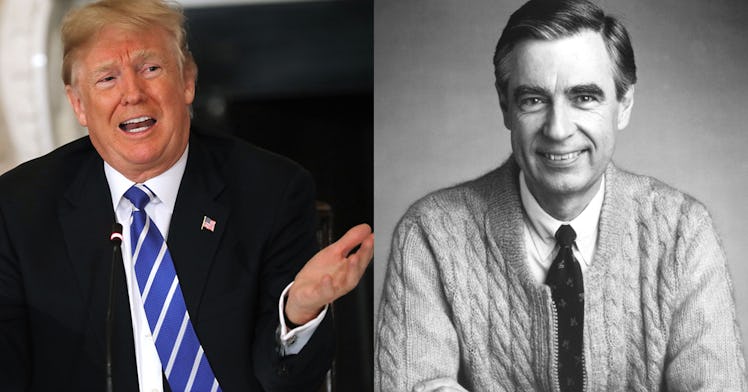Trump Thinks “Mister Rogers” Is an Insult. He’s Wrong.
It's what happens when you value cruelty over kindness.

One of President Trump’s most consistent character traits is his tendency to bully those who stand up to him. There’s a reason that he surrounds himself with family members and sycophants, why Dan Coats is one of the few independent voices left in the administration.
As the Director of National Intelligence, Coats’s job is to deliver impartial information to the president, not talking points designed to flatter him. That’s made the former Senator and ambassador to Germany the recipient of a presidential nickname: Mister Rogers.
Trump uses the nickname in private, according to NBC News, when Coats “won’t implement a directive or has left the impression he thinks the president is irrational.” The president’s immediate reaction to being challenged is to attack a lack of braggadocio he identifies with Fred Rogers and equates with weakness.
It’s hard to think of two more different public figures than Trump and Rogers, the children’s television icon. Trump has spent his life embracing cruelty at every turn. When he stiffed contractors, walked in on pageant dressing rooms, cheated on his wives, and bragged about sexually assaulting women he was being cruel.
Mister Rogers, on the other hand, dedicated his life to kindness. He was a Presbyterian minister who made it his mission to use television as a way to to make kids feel good about themselves and teach them about the happy things in the world.
Look at their catchphrases. Before he became president, Trump’s lasting legacy would likely have been “You’re fired,” his famous line from The Apprentice, a show that made cruelty into a game. Rogers’s “Won’t you be my neighbor?” is welcoming and warm. It’s hard to come up with a starker contrast.
Stylistically, there’s also a massive gulf between the two men. Trump is brash and aggressive; Rogers is soft-spoken and passive. Trump insults his enemies with emasculating innuendo and nicknames; Rogers, while never a gay rights champion, was unthreatened by his own bisexuality, and never used masculinity as a weapon the way the president does.
Trump’s invocation of Mister Rogers in a negative light is part of a proud rightwing tradition of criticizing Mister Rogers. Making kids think that they’re special just for being themselves, the thinking goes, discourages hard work, the force that powers capitalism, and is therefore anti-American. It’s similar to the conservative critiques of participation trophies as damaging, and their contention that millennials are lazy because they were coddled.
So while President Trump’s invocation of Rogers’s name as something close to a slur may feel new, it is, as with many things about this president, simply a more obvious, more obnoxious version of what conservatives have been thinking for decades.
Editor’s Note: We previously stated Rogers was an Episcopalian minister when he was actually Presbyterian. The article has been updated to reflect the correct information.